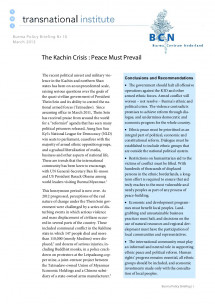Ideas into movement
Boost TNI's work
50 years. Hundreds of social struggles. Countless ideas turned into movement.
Support us as we celebrate our 50th anniversary in 2024.

As 2012 progressed, perceptions of the real nature of change under the Thein Sein government were challenged by a series of disturbing events in which serious violence and mass displacement of civilians occurred in several parts of the country.

If you have trouble viewing this publication in PDF, please kindly use an alternative PDF viewer.
The recent political unrest and military violence in the Kachin and northern Shan states has been on an unprecedented scale, raising serious questions over the goals of the quasi-civilian government of President Thein Sein and its ability to control the national armed forces (Tatmadaw). Since assuming office in March 2011, Thein Sein has received praise from around the world for a “reformist” agenda that has seen many political prisoners released, Aung San Suu Kyi’s National League for Democracy (NLD) win seats to parliament, ceasefires with the majority of armed ethnic opposition groups, and a gradual liberalisation of media, business and other aspects of national life. These are trends that the international community has been keen to encourage, with UN General-Secretary Ban Ki-moon and US President Barack Obama among world leaders visiting Burma/Myanmar.
This honeymoon period is now over. As 2012 progressed, perceptions of the real nature of change under the Thein Sein government were challenged by a series of disturbing events in which serious violence and mass displacement of civilians occurred in several parts of the country.
These included communal conflict in the Rakhine state in which 147 people died and more than 110,000 (mostly Muslims) were dis- placed, and dozens of serious injuries, including Buddhist monks, in a police crack- down on protestors at the Letpadaung copper mine, a joint-venture project between the Tatmadaw-owned Union of Myanmar Economic Holdings and a Chinese subsidiary of a state-owned arms manufacturer.
The most protracted violence, however, took place in northeast Burma during a government offensive against the Kachin Independence Organisation (KIO), an armed ethnic opposition group calling for ethnic rights and autonomy. Until the Thein Sein government came to power, the Kachin region had witnessed 17 years of ceasefire. But since fighting resumed in June 2011, thousands of casualties killed or injured – as well as more than 100,000 internally displaced civilians – have been reported.
Conclusions and Recommendations
Pages: 20